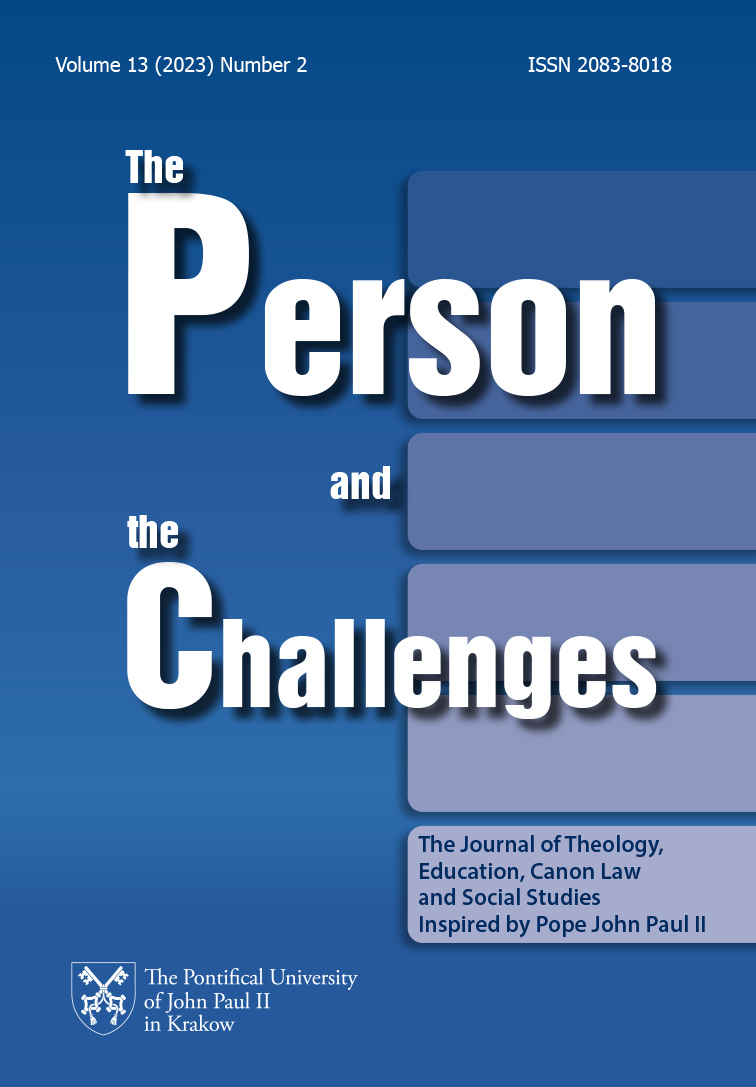Karol Wojtyla’s Efforts and Contemporary Attitudes towards Parenthood. Success or Failure
DOI:
https://doi.org/10.15633/pch.13202Keywords:
Karol Wojtyła, responsible parenthood, family planning methods, attitudes towards procreationAbstract
Not only during the period of his Pontificate, but also during previous years, the activity of Karol Wojtyła is worth recalling, appreciating and internalizing, and his preached and written teaching on responsible parenthood should be put into practice. The teaching about man, love, marriage, and parenthood is still relevant today. However, there are both those who support them as well as those who oppose them, particularly, opponents who avoid moral principles, especially in the field of the transmission of life. Therefore, a question arises about the effects of Cardinal Wojtyła’s efforts to protect the dignity of a child and a woman – mother, as well as morality in the area of procreation. The victory of the truth, visible in the encyclical Humanae vitae promulgated by Paul VI, is a success, while the spread of demoralization experienced to this day by groups promoting abortion and contraception and especially the poor moral condition of future spouses and parents, creates new challenges.
References
Bajda J., Zagadnienie równości mężczyzny i kobiety w dziedzinie małżeństwa, in: Memoriał Krakowski, Poznań 2012, BONAMI, pp. 27–29.
Benedict XVI, Pastoral Visit of His Holiness Pope Benedict XVI in Poland Address by The Holy Father Welcome Ceremony Warsaw Airport, Okęcie, 25 May 2006 https://www.vatican.va/content/benedict-xvi/en/speeches/2006/may/documents/hf_ben-xvi_spe_20060525_poland-arrival.html (21.07.2022).
Dudziak U., Miłość, małżeństwo i co dalej, Częstochowa 2001, Edycja Świętego Pawła.
Dudziak U., Metody planowania rodziny a zdrowie kobiety, in: J. Meder (Ed.), Problemy zdrowia psychicznego kobiet, seria “Biblioteka Psychiatrii Polskiej” Kraków 2003, Polskie Towarzystwo Psychiatryczne, pp. 65–75.
Dudziak U., Misterium ludzkiego życia od poczęcia do umierania. Studium dla duszpasterzy i doradców życia rodzinnego, Lublin 2021, Wydawnictwo KUL.
Dudziak U., Postawy wobec wychowania seksualnego a hierarchia wartości nauczycieli. Studium teologiczno pastoralne, Lublin, 2009, Wydawnictwo KUL, pp. 152–153.
Eberstadt M., The prophetic power of Humanae Vitae, “First Things” (2018), 4. https://www.firstthings.com/article/2018/04/the-prophetic-power-of-humanae-vitae (08.07.2022).
Furtak K., Postawy wobec planowania rodziny osób przygotowujących się do zawarcia sakramentu małżeństwa, Praca magisterska, Lublin 2011, Archiwum KUL.
Gałuszka P., Karol Wojtyła i Humanae vitae. Wkład arcybiskupa krakowskiego i grupy polskich teologów w encyklikę Pawła VI, transl. K. Stopa, Warszawa 2018, Muzeum Jana Pawła II i Prymasa Wyszyńskiego, pp. 138–139.
Gałuszka P., Gospodarek D., 50 rocznica publikacji encykliki “Humanae vitae” Pawła VI. https://m.niedziela.pl/artykul/36857/50-rocznica-publikacji-encykliki-Humanae (09.07.2022).
Historia duszpasterstwa, https://wdr.diecezja.pl/historia/ (08.07.2022).
Jóźwiak M., Humanae vitae, czyli trwałe pęknięcie w Kościele, (24.07.2020.). https://misyjne.pl/humanae-vitae-czyli-trwale-pekniecie-w-kosciele/ (09.07.2022).
Lewtak A., Postawy nupturientów wobec ojcostwa, praca magisterska, Lublin 2019, Archiwum KUL.
Lewtak D., Postawy nupturientek wobec macierzyństwa, praca magisterska, Lublin 2019, Archiwum KUL.
Lis K., Postawy młodzieży maturalnej wobec moralności małżeńsko-rodzinnej, praca magisterska, Lublin 2015, Archiwum KUL.
Meissner K., Normy moralne tyczące regulacji poczęć i ich uzasadnienie, in: K. Wojtyła et al., Wprowadzenie do encykliki Humanae vitae. Poznań 2012 BONAMI, pp. 103–111.
Meissner K. Odpowiedzialne rodzicielstwo, in: K. Wojtyła et all, Wprowadzenie do encykliki Humanae vitae, Poznań 2012, BONAMI, pp. 99–103.
Meissner K., Przedsłowie. Historia i przedstawienie dokumentu, in: Memoriał Krakowski. Uzasadnienie katolickiej nauki tyczącej podstaw moralnych życia małżeńskiego, Kraków 1968 i Wprowadzenie do encykliki Humanae vitae, Kraków 1969, Poznań 2012, BONAMI, pp. 7–9.
Muzeum Jana Pawła II i Stefana Wyszyńskiego Mt 5,14, 18 lutego 1941 umiera Wojtyła senior, https://mt514.pl/umiera-karol-wojtyla-senior/ (08.07.2022).
Pastoral Constitution On The Church In The Modern World Gaudium et Spes Rome 1965, “Acta Apostolicae Sedis” 58 (1966), pp. 1025–1120, https://www.vatican.va/archive/hist_councils/ii_vatican_council/documents/vat-ii_const_19651207_gaudium-et-spes_en.html (21.07.2022).
Paul VI, Encyclical Letter Humanae Vitae, On the regulation of birth, Rome 1968, Acta Apostolicae Sedis 59, pp. 481–503, https://www.vatican.va/content/paul-vi/en/encyclicals/documents/hf_p-vi_enc_25071968_humanae-vitae.html
(21.07.2022).
Rola M., Wartości moralne w świadomości maturzystów lubelskich. Studium socjologiczne, Lublin 2016, Wydawnictwo i Drukarnia Standruk.
Smoleński S., Uzasadnienie moralnego zakazu antykoncepcji ze strony Kościoła. Osoba ludzka jej godność i rozwój, in: Memoriał Krakowski, Poznań 2012, BONAMI, pp. 23–27.
Smoleński S., Turowicz J., Wskazania duszpasterskie, in: Wprowadzenie do encykliki Humanae vitae, Poznań 2012, BONAMI, pp. 122–129.
The Holy Bible. New International Version, East Brunswick, New Jersey, USA, 1984, International Bible Society.
Tomczyk J., Kontrowersje wokół Humanae vitae, “Teologia i moralność” vol. 15 (2020), nr 1 (27), pp. 163–178; Konferencja w Lambeth. Co wydarzyło się w 1930 roku?, https://doczz.pl/doc/3110848/konferencja-w-lambeth.-co-wydarzy%C5%82o-si%C4%99-w-roku-1930%3F (09.07.2022).
Turowicz J., Smoleński S., Uzasadnienie moralnego zakazu antykoncepcji ze strony Kościoła. Miłość małżeńska i dobro rodziny, in: Memoriał Krakowski, Poznań 2012, BONAMI, pp. 25–27.
Wojtyła K., Czym powinna być teologia moralna, “Ateneum Kapłańskie” (1959), 58, pp. 97–104.
Wojtyła K., Miłość i odpowiedzialność, Lublin 1986, TN KUL.
Wojtyła K., Tło historyczne powstania dokumentu, in: K. Wojtyła i inni, Wprowadzenie do encykliki Humanae vitae, Poznań 2012, BONAMI, pp. 72–78.
Wojtyła K. et all, Wprowadzenie do encykliki Humanae vitae, “Notificationese Curia Metropolitana Cracoviensi” (1969), 1–4, pp. 1–77; (wydanie z pierwodruku) Poznań 2012, BONAMI.
Wojtyła K., Zagadnienia katolickiej etyki seksualnej. Refleksje i postulaty, “Roczniki Filozoficzne” 13 (1965), 2, pp. 6–7.
Zykubek A., Ks. Prof. dr hab. Karol Wojtyła – Jan Paweł II, https://www.kul.pl/ks-prof-dr-hab-karol-wojtyla-jan-pawel-ii,art_60374.html (08.07.2022).
Downloads
Published
Issue
Section
License

This work is licensed under a Creative Commons Attribution 4.0 International License.
Authors who publish with this journal agree to the following terms:
- Authors retain the copyright and full publishing rights without restrictions, and grant the journal right of first publication with the work simultaneously licensed under a Creative Commons Attribution 4.0 International License that allows others to share the work with an acknowledgement of the work's authorship and initial publication in this journal.
- Authors are able to enter into separate, additional contractual arrangements for the non-exclusive distribution of the journal's published version of the work (e.g., post it to an institutional repository or publish it in a book), with an acknowledgement of its initial publication in this journal.
- Authors are permitted and encouraged to post their work online (e.g., in institutional repositories or on their website) prior to and during the submission process, as it can lead to productive exchanges, as well as earlier and greater citation of published work (See The Effect of Open Access).

